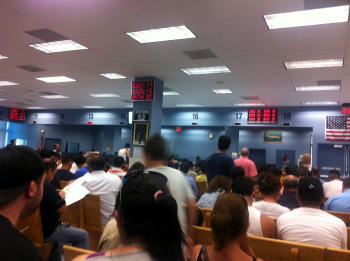
 Take-aways from HP's TouchPad screwup
Take-aways from HP's TouchPad screwup 
1. Their rollout sucked.
2. They only talked to the press, not users.
3. They announced it long before it shipped, and the shipment was a non-event.
4. They failed to say what was exciting about the product.
5. Once there was something exciting about it, very low price, it flew off the shelves.
6. People want interesting products in this area now.
7. People who think Apple has it sewn up are wrong.
8. Developers do not always flock to the largest installed base. At least not all developers.
9. There are still options for WebOS, esp if they do something to give full freedom to independent developers.
There was a time when it was said the Mac is dead, and no one is developing for it. I happened to have been developing for it at the time, so when they said that it only got me more motivated.
I would like to put my software on a tablet, but I don't see that happening for either Android or IOS. So there you go, there are developers who are looking for opportunities here and don't care about the size of your installed bas.
I am not saying I will invest in WebOS, not even close. They managed to completely screw it up and they needed to do the exact opposite. But to conclude that the iPad cannot be competed with is, afraid to say, very incorrect. There's a difference between saying HP is incapable of competing with Apple and Apple cannot be competed with.
 The DMV vs Verizon
The DMV vs Verizon 
Everyone cites the DMV as the example of why government sucks.
I wonder if they're right...
I had three hours to kill at the DMV in Queens a few weeks ago. The bench I sat on was hard, and the waiting room was packed and huge. Must have been a thousand people. And they were all New Yorkers, and like me they all had three hours to kill. What a scene.
What was interesting about it was how incredibly diverse it was. And how there was a chance to talk with people you normally don't get a chance to. These are the people you're driving next to on the Long Island Expressway or Van Wyck, or on 2nd Ave, or the Williamsburg Bridge. These are not necessarily the people you run into walking in Manhattan or riding the 7 train from Flushing.
There weren't a lot of rich people there, relative to the population, because it turns out you can pay someone to do your DMV schlep if you just need to register a car, as I did.
I had a book, but the place was too interesting. Instead I watched and thought.
The system was actually really well-designed. Considering how complex the process is, they moved people through pretty quickly. I didn't see anyone lazing around being unproductive. I tried to imagine if it would work any better if it were an insurance company running it? And interestingly to get the job done, I had to communicate with my insurance company and get them to wire something to the DMV. The kind of thing that might not work so well if it were say, Verizon or Time-Warner Cable. But it worked without a glitch. I happen to really like my insurance company, GEICO. Their systems are well designed, and use my time fairly effectively. Their website is a lot easier to use than my bank's or brokerage firms, for example.
I also imagined how many times the budget of the DMV had been trimmed, and how many rounds of layoffs they've had, and what kind of job security the people have. I don't really have a clue if the New York State DMV is under a lot of political pressure. But I wondered if working there wasn't a bit like working at the US Postal Service. I thought the people were really smart, and I was confused, and they were patient and repeated the instructions for me, while I wrote them down. The kind of things a lot of companies won't do for you.
 The conclusion I came to is that the DMV, a government agency, is better than a lot of the businesses I interact with. The theory that the businesses have to provide better service because they're competitive is too simplistic. A couple of days ago I wanted to get a service turned off with Verizon. I knew I was going to hit their "retention script" -- meaning they were going to deliberately drag their heels. An operation that I could have easily done on the website took about an hour. How many months of extra fees did they get before I got to the point where I could find an hour to get rid of the irritation and expenses. And how many other things do I pay for, every month, rather than going through the hassle to get the company to turn the service off.
The conclusion I came to is that the DMV, a government agency, is better than a lot of the businesses I interact with. The theory that the businesses have to provide better service because they're competitive is too simplistic. A couple of days ago I wanted to get a service turned off with Verizon. I knew I was going to hit their "retention script" -- meaning they were going to deliberately drag their heels. An operation that I could have easily done on the website took about an hour. How many months of extra fees did they get before I got to the point where I could find an hour to get rid of the irritation and expenses. And how many other things do I pay for, every month, rather than going through the hassle to get the company to turn the service off.
And Verizon's approach doesn't even maximize revenue. I was going to replace the device I was turning off with a different combination of features and probably even replace my cell phone and lock into another two year contract, which has run out. I'm a month to month customer. They haven't figured out yet that by enabling a smart customer to manage their own configuration, without introducing deliberate glitches, they might make even more money. And they might retain me by impressing me with their honesty, integrity and love of customer (which of course they don't have).
So I think people ought to think a bit more before they dis the DMV and repeat the Republican spin that government is worse at doing everything. Because in 2011, some businesses have grown so huge, and the Dliberts so thoroughly dominate, that it really isn't true.




